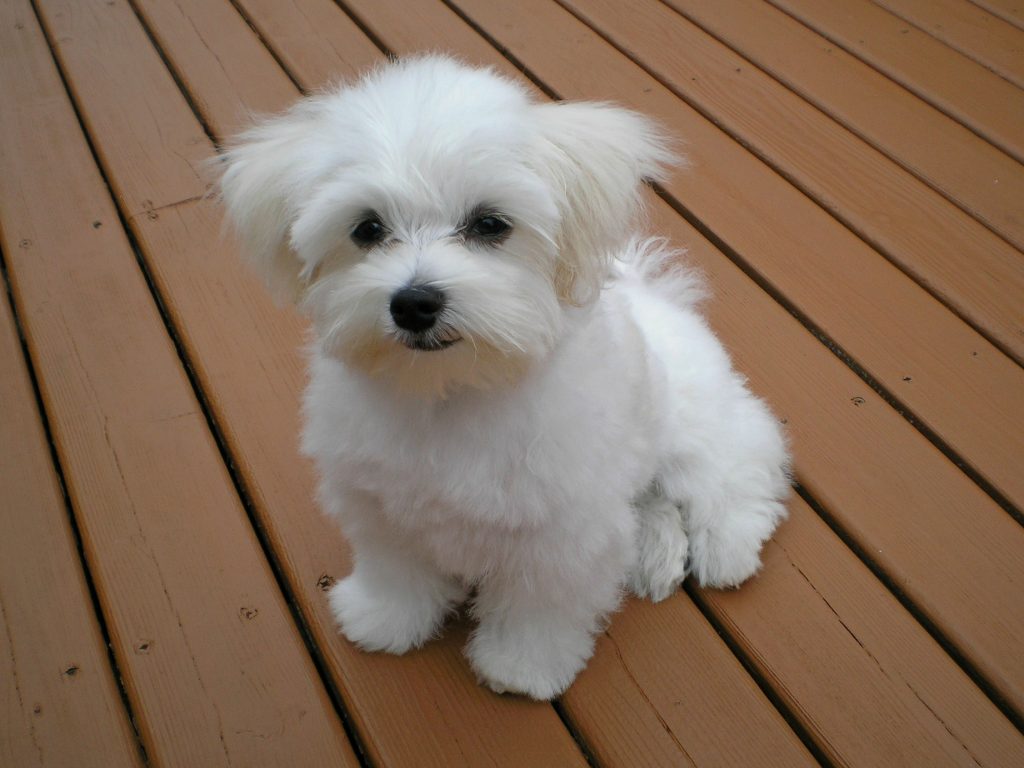Maltese dogs are popular family pets. In fact, they are one of the most popular breeds in the world. But is a Maltese a good family dog? When choosing a pet for your household, it is important to consider your lifestyle and then choose a dog breed that will blend in easily.
If you are considering adding a Maltese dog to your family, you should read this blog post first. We will discuss the pros and cons of owning a Maltese dog as a pet.
Key Takeaway
- A Maltese is generally considered a good family dog due to its friendly and affectionate nature, intelligence, and playful vigor, though care should be taken around larger dogs.
- The pros of owning a Maltese include their friendly and affectionate nature, low-shedding coat that’s good for allergy sufferers, adaptability to different living situations, relative ease of training due to their intelligence, and a long lifespan compared to other breeds.
- The cons of owning a Maltese include their high grooming needs, susceptibility to separation anxiety, potential for stubbornness, fragility due to their small size, and the high cost of purchasing and maintaining them from reputable breeders.
Is a Maltese a Good Family Dog?

Yes. Malteses are generally considered to be good family dogs because they are gentle and playful. They are also typically very easy to train, which makes them a great choice for families with children.
They love spending time with their families and enjoy playing games like fetch and hide-and-seek. Maltese are also very protective of their loved ones and will bark if they hear or see something strange.
Maltese also tend to be very low-maintenance dogs and don’t require a lot of exercise or grooming.
This makes them the perfect pet for people who lead busy lives or who don’t have a lot of experience caring for pets.
Maltese do not require a lot of maintenance, but they do need to be groomed regularly. You will need to brush your Maltese coat at least once a week to keep it healthy and free of mats.
Haircuts every three months are also recommended, especially if your Maltese has long hair. Be sure to trim your Maltese’s nails at least once a month, and check his or her ears for wax buildup and infection.
Maltese dogs are small in size and typically only require a moderate amount of exercise. A 30-minute walk each day should be sufficient for most Maltese dogs.
Additionally, playing fetch or taking your dog to the park for a romp are also great exercises for your Maltese. Be sure to monitor your dog’s activity and adjust their exercise routine accordingly if they start to look overweight or out of shape.
Pros of Owning a Maltese
Owning a Maltese dog offers several advantages, including their friendly nature, low-shedding coat, and adaptability to various living situations.
Friendly and Affectionate
Maltese dogs are known for their friendly and affectionate demeanor. They love to be around their human family and are known to get along well with other pets. Their friendly nature makes them great companions, and they can provide a lot of comfort and happiness to their owners.
Low-Shedding Coat
One of the significant advantages of owning a Maltese is their low-shedding coat. Unlike many other breeds, Maltese dogs do not shed much, making them a good choice for people with allergies or those who don’t want to deal with a lot of pet hair in their homes.
Adaptable
Maltese dogs are highly adaptable to various living situations. They can live comfortably in an apartment or a large house. As long as they get enough exercise and mental stimulation, they can adapt to a variety of living situations. This makes them a good choice for both city dwellers and those living in suburban or rural areas.
Easy to Train
Maltese dogs are intelligent, which makes them relatively easy to train. They are quick learners and can pick up on commands and tricks with consistency and positive reinforcement. This makes them a good choice for first-time dog owners or those who want a dog that can learn quickly.
Long Lifespan
Maltese dogs are known to have a relatively long lifespan compared to some other dog breeds. With proper care and regular veterinary check-ups, Maltese can live anywhere from 12 to 15 years or more. This long lifespan allows owners to enjoy many years with their furry friends.
Cons of Owning a Maltese
While Maltese dogs are wonderful companions, they can have their drawbacks, including high grooming needs, susceptibility to separation anxiety, and a potential for stubbornness.
High Grooming Needs
Maltese dogs have long, silky hair that requires regular maintenance to keep it looking its best. They require daily brushing to prevent matting and tangling, and regular trips to the groomer for trims. Owners need to be prepared for the time and financial commitment that this level of grooming requires.
Susceptibility to Separation Anxiety
Maltese dogs form strong bonds with their owners and can struggle with being left alone for extended periods. This can result in separation anxiety, where the dog becomes distressed and exhibits problem behaviors when left alone. Owners may need to invest in training or other solutions to manage this issue.
Potential for Stubbornness
Though generally intelligent and eager to please, Maltese dogs can sometimes show a stubborn streak. This can make certain aspects of training challenging, and owners will need to be patient and consistent in their training methods.
Fragility
Due to their small size, Maltese dogs can be more fragile than larger breeds. Owners must take care to prevent injury, such as from falls or rough play with larger pets. This fragility can also make them less suitable for homes with very young children who may not understand how to handle them gently.
Breeder Prices
The cost of purchasing a Maltese from a reputable breeder can be quite high. While this initial cost is worth it for a healthy, well-bred puppy, it is a factor that potential owners need to consider. Ongoing costs for things like food, grooming, and veterinary care also need to be factored into the decision to get a Maltese says Your Purebreed Puppy.
Are Maltese Good For First-Time Owners?

Yes. Maltese are a great breed for first-time dog owners because they are affectionate and love to be around people. They are intelligent and easy to train which makes them great for people that don’t have experience in training dogs.
Also, the Maltese are small and don’t take a lot of space. Their size combined with the fact that they are non-shedding and hypoallergenic makes them great for apartment dogs.
If you’re looking for a small, low-maintenance dog that is easy to train and loves being around people, the Maltese may be the perfect breed for you.
Maltese make great first-time dogs because they are such gentle creatures, but they still require plenty of exercise and mental stimulation like most dogs do. So if you’re prepared to put in a little effort, a Maltese could make the perfect addition to your family.
As a first-time Maltese owner, you have to understand that this breed requires a lot of exercise. A good way to start is by taking your dog for a walk around the block. Once your Maltese gets used to that, gradually increase the distance until your Maltese can handle a long walk or even a jog.
Maltese dogs also enjoy playing fetch and other games that involve running around. If you have time, take your Maltese to a park so it can run free.
In addition to getting plenty of exercise, it’s important to mentally stimulate your Maltese dog as well. Dogs are intelligent animals and need stimulation in order to stay happy and healthy. Puzzle toys are great for this; they keep dogs entertained and help them use their brains.
How Often Can I Bathe My Maltese?

In general, you can bathe your Maltese once a month. However, some Maltese may require more frequent baths. This all depends on where you keep your Maltese and how dirty it gets.
For example, when it’s rainy season and you take your Maltese out for a walk, there is a good chance that you will return with a muddy Maltese that needs a bath.
Maltese bred for a show should only be bathed about once a month, as overbathing can strip their coats of essential oils. However, if your Maltese is more of a pet and doesn’t compete in shows, then you can bathe them about every two weeks.
As for the age of your Maltese, puppies should be bathed more frequently than adult dogs since they have less oil in their coats and are more prone to skin problems. You can probably cut back on the bathing frequency as your dog gets older, but you’ll still want to give them a good bath every now and then.
When it comes time to give your Maltese a bath, there are a few things you’ll need to have on hand. You’ll need shampoo, conditioner (if desired), towels, and maybe a blow dryer (optional). It’s also helpful to have a spray bottle filled with water so that you can wet the dog’s coat before applying the shampoo.
To bathe your Maltese, start by filling a bathtub or sink with warm water and adding a small amount of dog shampoo. Wet your dog’s coat with the spray bottle, then apply the shampoo and massage it into the fur. Be sure to avoid getting any shampoo in your dog’s eyes.
Rinse the shampoo off with warm water, then condition (if desired) and rinse again. Finally, towel dry your dog and brush its coat to remove any leftover dirt or dried soap. Voila! Your Maltese is clean and ready to go.
FAQs
Q: What makes a Maltese a good family dog?
A: Maltese dogs have a gentle and playful nature, making them great companions for families. They are cheerful, adaptable, and get along well with children and other pets.
Q: Are Maltese dogs good with kids?
A: Yes, Maltese dogs are generally good with kids. However, it’s important to ensure that interactions between small children and dogs are supervised to avoid any mishaps.
Q: Do Maltese dogs require a lot of grooming?
A: Yes, Maltese dogs have a long, silky coat that requires regular grooming. Daily brushing, monthly baths, and occasional trips to a professional groomer are necessary to keep their coat in good condition.
Q: Are Maltese dogs easy to train?
A: Maltese dogs are intelligent and eager to please, which makes them relatively easy to train. However, like any dog, consistency, patience, and positive reinforcement methods should be used during training.
Q: Do Maltese dogs bark a lot?
A: Maltese dogs are known to be alert and will often bark to alert their family of strangers or potential dangers. However, excessive barking can be curbed through proper training and socialization.
Q: Are Maltese dogs good for first-time dog owners?
A: Yes, Maltese dogs can be a good choice for first-time dog owners. They are generally easy to handle and adapt well to different living situations. However, it’s important for owners to research and understand the breed’s specific needs and characteristics.
Q: Do Maltese dogs require a lot of exercise?
A: Maltese dogs are small in size and don’t require a lot of exercise compared to larger breeds. Daily walks and some playtime inside the house are usually sufficient to keep them happy and healthy.
Q: Are Maltese dogs prone to any health issues?
A: Maltese dogs are generally healthy, but like any breed, they can be prone to certain health issues. Some common health concerns in Maltese include dental problems, eye conditions, and luxating patella. Regular vet check-ups and preventive care can help manage these issues.
Q: Are Maltese dogs suitable for apartment living?
A: Yes, Maltese dogs are well-suited for apartment living. They can easily adapt to small living spaces and don’t require a large yard to roam. However, it’s important to provide them with regular exercise and mental stimulation.
Conclusion and final thoughts
In conclusion, Maltese dogs make excellent family pets due to their small size, gentle nature, and affectionate personalities.
They are low-maintenance dogs that thrive on human companionship and love being a part of the family.
However, potential owners should be aware of their grooming needs and be prepared to provide proper socialization and training to prevent any behavioral issues.




